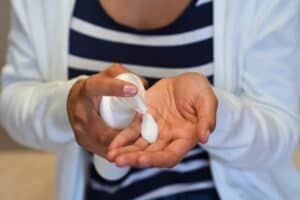Acne is seen as a problem for teens, but unfortunately pimples and zits don’t magically stop appearing once you become an adult.

Many people have a lot to say about adult acne, but how much of it should you believe?
We see what’s fact and what’s fiction with these nine adult acne myths.
1. Myth or truth: It’s all down to your hormones
Truth (for some people): Adult acne, especially in women, is usually due to a hormonal imbalance. Hormones can be affected by many things such as birth control and child birth. Pre-menopausal acne is also very common.
If you’re suffering from adult acne, see a doctor to have your hormone levels checked – it could be the answer to your problems.
2. Myth or truth: Washing your skin often is important in treating acne
Myth: Washing and scrubbing your face too often, and also too aggressively, will actually irritate your skin more. This can increase redness, flakiness and cause more distress to your skin. It’s important to wash your face gently in the morning and at night.
3. Myth or truth: Acne mostly affects people with oily skin
Myth: People with sensitive or very dry skin can also suffer from acne. Acne begins as clogged pores, most commonly blackheads or whiteheads, due to a combination of skin inflammation, bacteria on the skin and enlarging oil glands.
So people with all skin types can suffer from adult acne, and if you have adult acne, don’t assume you need to use products for oily skin!
4. Myth or truth: Make-up makes acne worse
Myth: Although some beauty products can clog your pores – which can ultimately lead to pimples – there are some beauty products that can actually improve acne. Powder-based mineral foundations can absorb excess oils that would otherwise clog your pores.
Look for products that say “non-comedogenic”, as that indicates a formula that won’t block pores.
5. Myth or truth: Greasy foods cause acne

Myth: Although diet does play a role in your skincare, greasy foods like pizza or sweets like chocolate are not the main causes of adult acne. Women tend to crave these types of food during their premenstrual cycle where hormones fluctuate (when you’re more prone to break-outs).
An excess in dairy and sugar can trigger hormonal changes that promote inflammation and an increase in oil production on the skin.
6. Myth or truth: Removing blackheads prevents break-outs
Myth: If you have a pustule, which is a spot with a visible white or yellow bump of pus in the middle, it’s okay to gently squeeze it with your fingers. It is not advised to squeeze blackheads or cysts as these can cause scarring and possibly force bacteria deeper into the skin.
7. Myth or truth: Treat body acne as you would face acne
Myth: Using topical products meant for your face don’t absorb as well on your body. The follicles on your body are further apart from each other than on your face. It’s important to speak to your dermatologist about medication for body acne.
8. Myth or truth: Hair products have nothing to do with acne
Truth: Pomade acne is when the oils from your hair products constantly come in contact with your face and cause pimples. Avoiding products like petroleum jelly and using water-based hair products can help solve this problem.
9. Myth or truth: There’s nothing you can do about adult acne
Myth: A visit to a dermatologist is one of the best things you can do for yourself if you’re suffering from adult acne. No matter what you read online, nothing can replace a consultation with a medical professional.
Brought to you by All4Women






